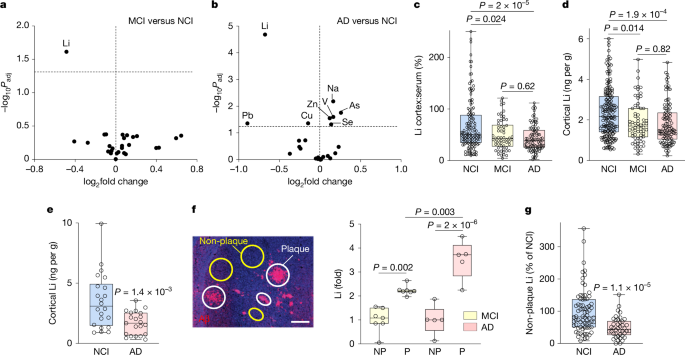Harvard Study Finds Possible Link Between Lithium and Alzheimer's

Introduction
A recent Harvard study has brought hope to the Alzheimer's community on Long Island. The study suggests a potential link between lithium loss and the development of Alzheimer's disease, offering the possibility of early detection and new treatments. However, experts urge caution, as further research is needed to fully understand this link.
Key Details
The study focused on the levels of lithium in the cerebrospinal fluid of patients with Alzheimer's disease. It found that those with lower levels of lithium were more likely to have the disease. This is significant because lithium is a naturally occurring element and its levels can be influenced by diet and environmental factors. This means that with further research, it may be possible to identify and address these factors to potentially prevent or delay the onset of Alzheimer's.
Impact
This study has the potential to greatly impact the field of Alzheimer's research and treatment. It offers a new avenue for early detection and prevention, which could have a significant impact on the lives of those affected by the disease. However, experts caution that more research is needed before any concrete conclusions can be drawn. Still, this study brings hope and a renewed sense of urgency to find effective treatments for Alzheimer's disease.
About the Organizations Mentioned
Harvard
## Overview Harvard University is the oldest institution of higher education in the United States, established in 1636 in Cambridge, Massachusetts[1][2][3]. Originally founded to train clergy, it has evolved into a global leader in education, research, and innovation, with a broad influence across business, technology, and society[1][2]. Harvard operates ten degree-granting schools and the Radcliffe Institute for Advanced Study, offering undergraduate, graduate, and professional programs to a diverse student body of over 24,500 students, supported by more than 20,600 faculty and staff[1][3]. Its alumni network exceeds 400,000 globally, and its reach extends to over 35 million learners through Harvard Online[3]. ## History and Structure Harvard’s history is marked by continuous expansion and adaptation. It began with a modest endowment from John Harvard and grew through philanthropy and strategic vision, becoming a secular, research-intensive university by the 20th century[1][3]. The university is governed by the Harvard Corporation (the oldest corporation in the Western Hemisphere) and the Board of Overseers, ensuring a blend of tradition and innovation in its leadership[3]. Harvard’s physical footprint includes the historic Cambridge campus, a growing Allston campus across the Charles River, and the Longwood Medical Area in Boston[1]. ## Key Achievements and Influence Harvard’s impact is evident in its alumni, faculty, and researchers, who include 8 U.S. presidents, 24 heads of state, 31 heads of government, 188 living billionaires, and numerous Nobel laureates, Fields Medalists, and Pulitzer Prize winners[1][2]. Harvard students and alumni have collectively won 10 Academy Awards and over 100 Olympic medals[1][2]. The university is also a powerhouse in research, with breakthroughs such as the development of the first direct genomic sequencing method and leadership in the Human Genome Project[6]. In 2025



















